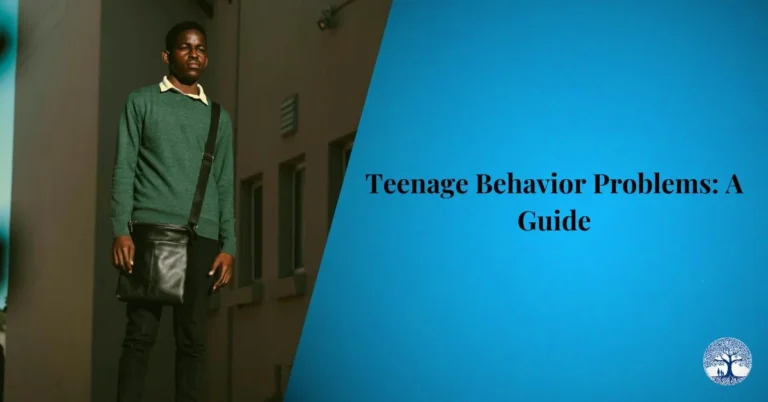Introduction
Navigating the teenage years can feel like walking a tightrope, especially when your once-compliant daughter starts pushing back against rules and authority. Did you know that around 75% of parents report facing some level of rebellion from their teenage daughters? This phase, though challenging, is a normal part of growing up, but it’s one that requires careful handling to avoid long-term strain on your relationship.
Understanding the underlying causes of rebellion and learning how to address them effectively is essential for maintaining a strong, healthy bond with your daughter during these formative years. In this blog post, we’ll explore why teenage girls rebel, common triggers, and practical strategies to help you navigate this complex phase, all while fostering a positive and respectful relationship with your daughter.
Understanding Rebellion in Teenage Daughters
What is Teenage Rebellion?
Teenage rebellion is a natural and often inevitable phase where adolescents challenge authority, assert independence, and test boundaries. For daughters, this rebellion can manifest in various ways, from defying household rules to adopting new attitudes that clash with parental expectations. It’s a critical part of their journey toward self-discovery and establishing a personal identity separate from their family. However, while some level of rebellion is normal, understanding its roots is key to managing it effectively.
Psychological and Emotional Factors
Rebellion in teenage daughters is deeply tied to the psychological and emotional upheavals of adolescence. During this period, they are forming their identity, a process that often involves questioning and rejecting parental norms. Hormonal changes, particularly the fluctuations in estrogen, can also lead to mood swings and impulsive behavior. Peer pressure further complicates matters, as daughters might feel compelled to conform to their friends’ behavior, even if it goes against family values. This blend of internal and external pressures creates a perfect storm that can lead to rebellious actions.
Signs of Rebellion
Recognizing the signs of rebellion early on can help parents intervene constructively. Common signs include:
- Frequent Defiance: Refusing to follow rules or questioning authority figures at home and school.
- Changes in Attitude: Displaying a sudden shift in behavior, such as becoming more argumentative or withdrawn.
- Risk-Taking Behavior: Engaging in activities like skipping school, experimenting with substances, or forming new, possibly negative, friendships.
- Emotional Volatility: Exhibiting more frequent mood swings, from anger and frustration to sadness or anxiety.
- Decreased Communication: Pulling away from family conversations and preferring isolation or excessive time with peers.
By understanding these aspects, parents can approach the situation with empathy and insight, paving the way for more effective communication and resolution.

Common Causes of Rebellion in Teenage Daughters
Lack of Communication
Effective communication is the cornerstone of any healthy relationship, especially between parents and teenage daughters. When communication breaks down, it often leads to misunderstandings, frustration, and a sense of disconnect. Daughters who feel unheard or misunderstood may resort to rebellious behavior as a way to express their emotions or to force a reaction from their parents. Poor communication can create a cycle where the more a daughter rebels, the less the parents engage, exacerbating the issue. Open, honest, and empathetic dialogue is essential to bridge this gap and prevent rebellion from escalating.
Desire for Independence
As daughters enter adolescence, their natural desire for independence becomes more pronounced. They begin to seek autonomy in their decisions, friendships, and identity. This quest for independence can sometimes be mistaken for rebellion, especially when it involves rejecting parental guidance or established norms. Parents may struggle with this shift, leading to conflicts when daughters push back against rules or attempt to carve out their own space. It’s important for parents to recognize that this desire for independence is a healthy part of growing up and to find a balance between providing guidance and allowing autonomy.
Social Influence and Peer Pressure
Teenagers are highly susceptible to social influences, and the desire to fit in with peers can play a significant role in rebellious behavior. Friends, social media, and peer groups can all exert pressure on daughters to conform to certain behaviors, attitudes, or trends that may clash with parental values. For example, a daughter might adopt rebellious actions or attitudes to gain acceptance from a peer group or to emulate behaviors seen on social media. Understanding the impact of these social influences is crucial for parents, who can then guide their daughters in navigating peer pressure while maintaining their individuality and family values.
Parental Expectations and Rules
Strict or unrealistic expectations from parents can be a major trigger for rebellion in teenage daughters. When daughters feel overwhelmed by high demands or suffocated by rigid rules, they may rebel as a form of resistance. This rebellion can manifest as defiance, secretive behavior, or even outright disobedience. It’s essential for parents to set clear but reasonable expectations that align with their daughter’s capabilities and needs, and to be flexible when necessary. Creating a supportive environment where rules are explained, and expectations are realistic can help mitigate the urge to rebel and foster a more cooperative relationship.
By understanding these common causes, parents can better address the root issues behind their daughter’s rebellious behavior and work towards a more harmonious and understanding relationship.
Effective Strategies for Dealing with a Rebellious Daughter
Open Communication
Open communication is the foundation of a strong parent-daughter relationship, especially during the teenage years. To foster honest conversations, parents should create an environment where their daughter feels safe expressing her thoughts and emotions without fear of judgment. This involves actively listening to her, acknowledging her feelings, and avoiding interrupting or dismissing her concerns. Ask open-ended questions that encourage her to share more about her life, struggles, and aspirations. Regular, meaningful dialogue can help bridge the gap between parent and daughter, reducing misunderstandings and minimizing the need for rebellion as a form of communication.
Setting Boundaries with Flexibility
Establishing boundaries is crucial for maintaining order and safety in the household, but it’s equally important to balance these rules with flexibility. Rigid, unyielding rules can lead to frustration and rebellion, while too much leniency can result in a lack of structure. The key is to set clear, reasonable boundaries that your daughter understands and agrees to. Involve her in the process of creating these rules, as this can give her a sense of ownership and responsibility. Flexibility is essential—be willing to adjust the rules as she grows and demonstrates increased maturity, showing her that you trust her judgment while still providing guidance.
Empathy and Understanding
Empathy is a powerful tool in diffusing rebellious behavior. By putting yourself in your daughter’s shoes, you can better understand the pressures and challenges she faces, whether they stem from school, friendships, or personal struggles. Showing empathy doesn’t mean condoning negative behavior, but rather acknowledging her feelings and validating her experiences. When she sees that you genuinely understand her perspective, she’s more likely to open up and less likely to rebel. Empathy also helps in de-escalating conflicts, making it easier to reach a resolution that both of you can agree on.
Positive Reinforcement
Positive reinforcement is an effective way to encourage good behavior and reduce the likelihood of rebellion. Instead of focusing solely on correcting negative actions, praise your daughter when she demonstrates responsibility, honesty, or other positive traits. This could be as simple as acknowledging her efforts in school, appreciating her help around the house, or recognizing when she makes a mature decision. Positive reinforcement boosts her self-esteem and reinforces the behavior you want to see more of, creating a cycle of positive actions and responses.
Seek Professional Help if Necessary
Sometimes, despite your best efforts, rebellious behavior may persist or escalate to a point where professional intervention is necessary. If your daughter’s rebellion is affecting her well-being, academic performance, or relationships, it might be time to consult a counselor or therapist. A professional can provide valuable insights into underlying issues, offer strategies for managing behavior, and facilitate communication between you and your daughter. Seeking help is not a sign of failure, but rather a proactive step towards ensuring your daughter’s long-term health and happiness.
By applying these strategies, parents can create a supportive and understanding environment that helps their daughters navigate the challenges of adolescence without resorting to rebellion.

Common Mistakes to Avoid
Overreacting to Rebellion
When faced with rebellion, it’s natural for parents to feel frustrated or even alarmed. However, overreacting can often exacerbate the situation, leading to increased tension and further defiance. When parents react with anger, harsh punishments, or ultimatums, it can push their daughter further away, reinforcing the very behavior they’re trying to curb. Instead, it’s important to stay calm and composed, even in the face of challenging behavior. Taking a step back, breathing deeply, and approaching the situation with a level head allows for more constructive conversations and solutions. This approach not only de-escalates conflicts but also models self-control and emotional regulation for your daughter.
Ignoring the Issue
On the other end of the spectrum, ignoring signs of rebellion can be just as detrimental. Some parents may avoid confronting their daughter’s rebellious behavior out of fear of conflict or hope that it will resolve on its own. However, ignoring the issue often leads to bigger problems down the line, as unresolved issues can escalate into more serious behavior or emotional difficulties. It’s essential to address signs of rebellion early on, even if the conversations are uncomfortable. Tackling the issue head-on shows your daughter that you care about her well-being and are willing to work through problems together.
Inconsistent Parenting
Inconsistency in parenting, particularly when it comes to enforcing rules and consequences, can create confusion and frustration for your daughter. When expectations are unclear or consequences are applied unevenly, it undermines the structure and predictability that teenagers need to feel secure. For example, if curfew times are sometimes enforced and sometimes overlooked, your daughter may become confused about what is actually expected of her, leading to more rebellious behavior as she tests the boundaries. Consistent parenting, where rules are clear and consequences are applied fairly, helps establish a sense of stability and trust. It also reinforces the idea that rules are in place for her safety and well-being, not just as a form of control.
By avoiding these common mistakes, parents can create a more stable and supportive environment that reduces the likelihood of rebellion and fosters a stronger, more understanding relationship with their daughter.
Parenting Examples
Story 1: Overcoming Rebellion Through Communication
Consider the story of Sarah and her daughter Emily. Emily, a typically cheerful and cooperative teenager, began to exhibit signs of rebellion as she entered high school. She started coming home late, arguing about curfew, and withdrawing from family activities. Sarah, initially frustrated and confused, realized that her usual approach of issuing directives wasn’t working. Instead of escalating the situation with more rules and punishments, Sarah decided to take a different approach—open communication. She sat down with Emily during a calm moment and expressed her concerns without judgment, asking Emily to share what was going on in her life.
This open dialogue revealed that Emily was struggling with the pressures of school and feeling misunderstood by her friends. By simply listening and showing empathy, Sarah was able to connect with Emily on a deeper level. Over time, Emily became more willing to discuss her feelings and was less inclined to rebel, knowing she had a safe space to express herself at home.
Story 2: The Role of Therapy in Resolving Conflict
Another example is the story of the Johnson family, who faced severe challenges with their daughter, Lily. Lily’s rebellion escalated from defying household rules to engaging in risky behaviors, such as skipping school and experimenting with alcohol. Her parents, feeling overwhelmed and unsure of how to handle the situation, decided to seek professional help. They engaged a family therapist who specializes in adolescent behavior. Through therapy, it became clear that Lily’s rebellion was partly fueled by unresolved emotional issues, including low self-esteem and a sense of inadequacy among her peers.
The therapist worked with the family to develop better communication strategies, helping Lily feel heard and supported while also setting clear and consistent boundaries. Over time, Lily’s behavior improved as she learned healthier ways to cope with her emotions, and her parents gained the tools to support her through the challenges of adolescence. The therapy not only resolved the immediate conflict but also strengthened the family’s overall dynamic, paving the way for a more harmonious future.
These examples highlight the importance of communication and, when necessary, professional intervention in addressing teenage rebellion. By being proactive and open to different approaches, parents can successfully navigate even the most challenging phases of their daughter’s adolescence.

Long-Term Benefits of Addressing Rebellion Early
Strengthened Parent-Daughter Relationship
Effectively addressing rebellion early on can have profound long-term benefits, particularly in strengthening the parent-daughter relationship. When parents approach rebellious behavior with understanding, patience, and open communication, it fosters a deeper bond built on trust and mutual respect. Over time, your daughter will come to see you not just as an authority figure but as a reliable source of support and guidance. This strengthened relationship creates a solid foundation that can withstand future challenges, ensuring that your daughter feels comfortable turning to you in times of need, even as she grows older.
Development of Healthy Coping Mechanisms
Addressing rebellion early helps your daughter develop healthier ways to cope with stress, emotions, and the pressures of adolescence. When rebellion is met with empathy and constructive communication, it teaches your daughter how to navigate difficult feelings without resorting to defiance or destructive behavior. By modeling and reinforcing positive coping strategies—such as discussing problems openly, seeking help when needed, and finding constructive outlets for emotions—you equip your daughter with valuable tools that she can use throughout her life. These healthy coping mechanisms will not only help her manage the challenges of adolescence but also serve her well into adulthood.
Preparation for Adulthood
Conflict resolution is a crucial skill for adulthood, and the way rebellion is addressed during the teenage years can significantly impact your daughter’s ability to handle future conflicts. By involving her in discussions, setting clear but flexible boundaries, and working through disagreements together, you’re teaching her important lessons about responsibility, negotiation, and compromise. These skills are essential for healthy relationships, whether with friends, partners, or colleagues in her future career. Addressing rebellion early helps your daughter learn how to assert herself, understand others’ perspectives, and find balanced solutions—all of which are vital for her success and happiness as an adult.
By focusing on these long-term benefits, parents can see the value in tackling rebellion head-on, knowing that the effort they put in now will pay off in a stronger, more resilient relationship with their daughter and in her development into a well-adjusted adult.
Conclusion
In conclusion, addressing rebellion in teenage daughters requires a thoughtful approach that balances open communication, empathy, and consistent boundaries. By understanding the root causes of rebellion and applying effective strategies, parents can not only navigate these challenging years but also strengthen their relationship with their daughters and prepare them for a successful adulthood. It’s important to remain patient and persistent, recognizing that change takes time and that your efforts will ultimately foster a healthier, more supportive family dynamic. If you’ve found this post helpful or have your own experiences to share, we encourage you to join the conversation in the comments below or reach out directly for further advice and support.
Check out our blog What Not To Say To Your Teenage Daughter, for more such content!
Frequently Asked Questions (FAQs)
1. What are some effective ways to improve communication with a rebellious daughter?
Improving communication with a rebellious daughter involves creating an environment where she feels heard and respected. Start by actively listening to her concerns without interrupting or judging. Use open-ended questions to encourage her to express her thoughts and feelings. Ensure that conversations are held in a non-confrontational setting, and be consistent in showing empathy and understanding. Avoid reacting with anger or frustration, which can further alienate her. Instead, focus on constructive dialogue that fosters mutual respect and trust.
2. How can I set boundaries without pushing my daughter further away?
Setting boundaries while maintaining a positive relationship requires a balanced approach. Clearly define the rules and the reasons behind them, and involve your daughter in the process to give her a sense of ownership. Be consistent in enforcing these boundaries, but also show flexibility where appropriate, acknowledging her growing need for independence. It’s crucial to communicate the purpose of the rules and to remain open to discussing them as she matures, ensuring she feels respected rather than controlled.
3. What are some signs that my daughter’s rebellious behavior might be due to underlying issues?
Signs that rebellious behavior might be linked to underlying issues include sudden changes in mood, a marked decline in academic performance, social withdrawal, or increased secrecy. If your daughter’s behavior includes risky actions such as substance abuse or frequent conflicts with peers, it may indicate deeper emotional or psychological struggles. Addressing these signs early by having open conversations and seeking professional help can prevent more serious issues from developing.
4. When should I consider seeking professional help for my daughter’s rebellious behavior?
Professional help should be considered if your daughter’s rebellious behavior is severe, persistent, or negatively impacting her well-being and family dynamics. If she exhibits signs of emotional distress, such as depression, anxiety, or substance abuse, and traditional parenting strategies are not effective, a counselor or therapist can provide valuable support. Therapy can offer both you and your daughter strategies to manage conflicts, improve communication, and address any underlying issues contributing to her behavior.
5. How can positive reinforcement be used effectively with a rebellious daughter?
Positive reinforcement involves acknowledging and rewarding your daughter’s positive behavior to encourage its continuation. To use it effectively, identify specific behaviors you want to reinforce, such as improved communication or responsible decision-making. Offer genuine praise, privileges, or small rewards when she demonstrates these behaviors. It’s important that the reinforcement is meaningful to her and that it’s used consistently to strengthen positive actions. This approach helps build her self-esteem and reinforces the behaviors you want to see, making it more likely that she will continue to exhibit them.








2 Comments